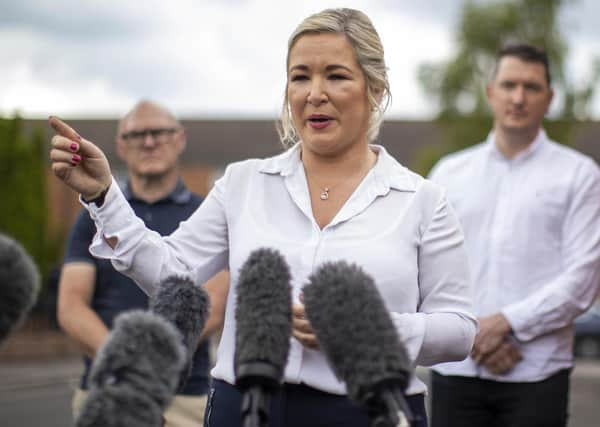Double take: SF MLAs’ strikingly similar contributions to amnesty debate


The SF Deputy First Minister, former IRA man-turned North Belfast MP Gerry Kelly, and national chairman Declan Kearney used very similar (and at one point, literally identical) phrasing during the special sitting of the Assembly.
During the debate all parties trashed the government’s idea of a blanket amnesty for pre-1998 crimes.
Advertisement
Hide AdAdvertisement
Hide AdMs O’Neill’s contribution was as follows: “The proposals are about more than providing legal protection for those who wore uniforms; they are actually about protecting those who wore suits.
“They are about protecting those in the upper echelons of the British political, military and intelligence world who designed, facilitated and covered up the policy and practice of British state terrorism, which involved state killings and torture practices in the interrogation centres, and presided over weapons importation and the administrative practices of collusion.
“Ultimately, the proposals are designed to insulate and protect British politicians at the highest level of government...
“It was a policy of collusion that armed and directed loyalist paramilitaries, resulting in the deaths of hundreds of Irish citizens, including many in my constituency.”
Advertisement
Hide AdAdvertisement
Hide AdMr Kelly then went on to state: “The proposals protect those behind the scenes, those in suits and the shadowy figures in the upper echelons who facilitated state killings, designed torture practices in interrogation centres, and presided over weapons importation and the administrative practice of collusion.”
And Mr Kearney then rose to tell MLAs: “The strategic purpose of the amnesty proposals is to protect the policy and decision-makers at the heart of the British political, military and intelligence establishment, the shadowy and not so shadowy figures and those whose Cabinet decisions and public interventions institutionalised and gave cover to the violence of state forces and their agents, those who presided over state-sponsored massacres and the summary executions of Irish citizens and authorised the reorganisation and arming of unionist paramilitary death squads...
“They are about blocking any investigation of the internment and torture policy, the recruitment of counter-gangs to carry out assassinations in nationalist areas, the use of intelligence and psychological operations, the political approval for shoot-to-kill operations by clandestine military operations.”
Advertisement
Hide AdAdvertisement
Hide Ad——— ———
A message from the Editor:
Thank you for reading this story on our website. While I have your attention, I also have an important request to make of you.
With the coronavirus lockdown having a major impact on many of our advertisers — and consequently the revenue we receive — we are more reliant than ever on you taking out a digital subscription.
Subscribe to newsletter.co.uk and enjoy unlimited access to the best Northern Ireland and UK news and information online and on our app. With a digital subscription, you can read more than 5 articles, see fewer ads, enjoy faster load times, and get access to exclusive newsletters and content. Visit https://www.newsletter.co.uk/subscriptions now to sign up.
Advertisement
Hide AdAdvertisement
Hide AdOur journalism costs money and we rely on advertising, print and digital revenues to help to support them. By supporting us, we are able to support you in providing trusted, fact-checked content for this website.